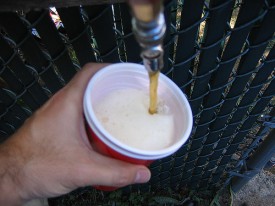Cash Isn't King–Liquidity Is
EMoney took a side trip this morning from the massive crowds gathering at Moscone in downtown San Francisco for the Game Developers Conference to Japantown, where there was an equally vibrant, albeit slightly smaller, conference called the Future of Money.
 EMoney was given the task of moderating a panel called “Leveraging New Markets” in front of a packed room with two other competing panels.
EMoney was given the task of moderating a panel called “Leveraging New Markets” in front of a packed room with two other competing panels.
The participants were Ted Sorom, the CEO of Rixty, Bruce Bower, the CEO of Plastic Jungle and Jeff Thomas, SVP of SecondMarket.
There’s no video, so you’ll have to endure a written recap from my perspective as chief interrogator.
First, if you aren’t familiar with these companies, the four of us can attest there’s only one thread in common: Liquidity, and creating marketplaces to make assets more fluid.
The discussion is well-timed as we push beyond e-commerce and Web 2.0 to a new reality, where reducing friction to payments is turning into a large opportunity.
One solution popping up everywhere is to create virtual currencies, which solves the problem of paying for many items at small price points because it doesn’t make economic sense to charge 50 cents to your credit card on a regular basis.
Meanwhile, there’s lots of clogs in the system, ranging from gift cards that are never redeemed, to a large population of people who don’t have credit cards, to the more extreme, like what will eventually happen to all of those unused Groupon and LivingSocial vouchers?
Here’s a look at how all three are trying to add liquidity to the system:
 Rixty: The San Francisco company allows consumers to buy prepaid cards with cash to be redeemed for game credits online, such as Facebook Credits and Zynga’s CityVille.
Rixty: The San Francisco company allows consumers to buy prepaid cards with cash to be redeemed for game credits online, such as Facebook Credits and Zynga’s CityVille.
On the panel, Sorom announced that Rixty’s distribution was increasing from 20,000 physical locations to 70,000 with the addition of Green Dot MoneyPak prepaid cards, which are sold at Walmart and 7-11. Greendot charges a $4.95 service fee, which Rixty will redeem as soon as soon as the card is spent online.
 Plastic Jungle: The San Jose, Calif.-based company is a secondary market for unwanted and unused gift cards.
Plastic Jungle: The San Jose, Calif.-based company is a secondary market for unwanted and unused gift cards.
The company buys them for up to 92 percent of face value, and sells them at a discount. Bower says some of the highest value gift cards are for Target and Walmart because they are the closest to cash. The lowest value cards are from local retailers or seasonal items, like See’s Candy, which only sell well on Valentine’s Day and Christmas.
 SecondMarket: The New York-based company is a secondary market for private stock in companies, such as Facebook and Twitter. It deals in getting liquidity to employees or shareholders, who can’t yet sell their stock on the public market.
SecondMarket: The New York-based company is a secondary market for private stock in companies, such as Facebook and Twitter. It deals in getting liquidity to employees or shareholders, who can’t yet sell their stock on the public market.
The summary is that while cash may still be king, the trend is to enable liquidity.
Some of the high-level takeaways:
— Thomas of SecondMarket: The company is constantly in headlines for being associated with Facebook’s $70 billion-plus or minus-private valuation. He said private company stock sales have become the fastest growing part of its business with transactions increasing to $400 million in 2010, up from only $100 million in 2009.
He said an essential part to keeping the assets liquid is to keep the information flowing, which is inherently difficult with companies that aren’t required to disclose any financial information. The company will soon be partnering with researchers to produce independent reports that will be purchased by potential investors.
Sorom of Rixty: One of the big questions was how dominate Facebook will be able to become as a virtual currency platform.
Most panelists agreed that it was inevitable that it will become a powerhouse, but that it will face hurdles on two fronts. In order for it to win, it will have to appeal both to consumers and merchants. And, currently it charges a 30 percent fee, which is much too high for most physical and even some digital goods.
Sorom said regulations will also limit its activities. Just like at Rixty, they have avoided allowing users too much liquidity. The credits can only be used for pre-approved merchants and can not be swapped or traded among friends. Similarly, Sorom believes that Facebook would not have that have that ability, given current federal regulations.
Bower at Plastic Jungle: Bower saved the best for last. Whenever trying to come up for a good description of liquidity think back to your college days, especially if they were pre-Internet.
As a crafty collegiate, he learned to live off one square meal, turning in his other meal plan points for cash. He purchased brand new textbooks on his parent’s dime and then returned them for used books a day later. All of the cash allowed him to gain the most important liquid asset of all — beer.
Photo Credit: Rick Scully.








